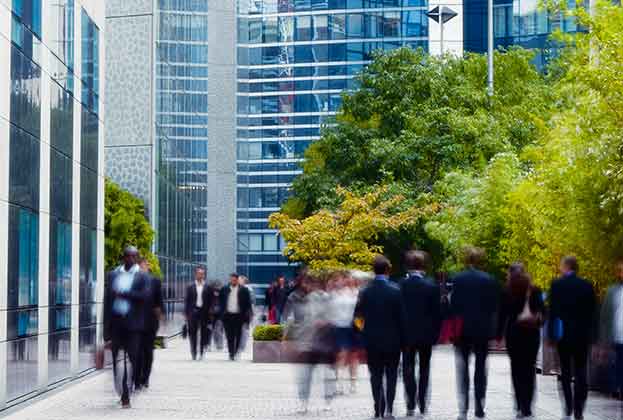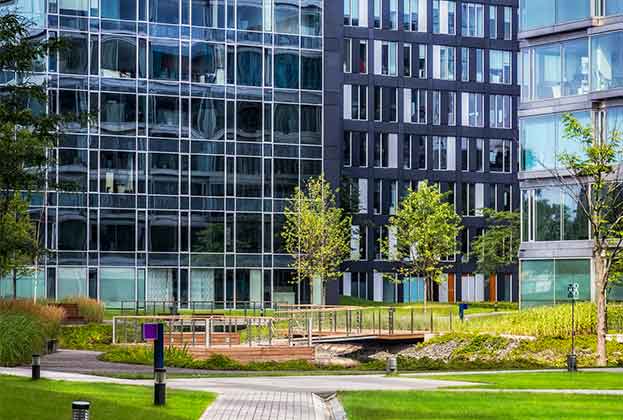Historically high employment and a limited supply of modern officesare driving office demand in Copenhagen
.jpg)
Although overall economic uncertainty is still present, the Danish office market continues to show positive signs. The labor market has been resilient and increased use of remote working has yet to have a significant impact on the demand for office space. The supply of modern, energy-efficient office facilities is limited, while the prospect of the "green premium" has begun to impact office rent levels in Copenhagen.
Rental trends, prime and secondary
There are currently no signs of a weakening in neither the prime nor the secondary office market. This may be due to the proportionally low supply of modern office space combined with a significant difference in office rent levels on prime and secondary locations.
Office rents in prime locations are stable around the level 2,700 DKK/psm., while rents in secondary locations are experiencing a slight upward trend to 1,750 DKK/sqm.
The high rent levels are linked to the low vacancy rate, which in Copenhagen city is estimated at 5.6 percent in Q2 2023. Compared to Q2 2022, this is a drop of 1.2 percentage points.
New lease needs
Considering changed work patterns, more companies are rethinking their office space needs and new requirements for office layout and appropriate technology. The growing trend of hybrid and remote working is increasing demand for flexible and serviced office solutions.
As occupiers increasingly prioritise sustainable qualities when choosing a new office space, ESG aspects are expected to become an integral part of the decision-making processes. This places increased demands on lessors to meet the growing demand for sustainable office space.
Savills has observed a trend towards higher rent levels for sustainable and eco-friendly properties, and this is according to Jacob Lund, because:
- Properties with the best sustainability certifications typically feature lower energy consumption which reduces operating costs for occupiers. For the lessors, it provides an incentive to charge a higher rent that reflects the value of sustainable and energy-efficient facilities. Lessors willing to manage older properties have a potential for increased rental income and accordingly can achieve a "green premium".
Occupiers want sustainable offices
ESG is a necessary and unavoidable dimension of modern business strategy, further reinforced by new EU regulations that from 2024 will require all major companies to report on their sustainability efforts. With this development, Savills expects that an increasing number of occupiers will specifically demand office space that meets their ESG requirements and supports their long-term sustainability strategy.
An increasing number of occupiers are implementing a more agile approach with shared workspaces and free seating to reduce the number of desks in their office.
Larger foreign companies express a need for office solutions which are both serviced and energy efficient. This contributes to accelerating the development among the lessors that actively utilise office layout, design and ESG as strategic tools in their letting practices.
Green premium affects rent levels
Occupier demand shows a strong preference for modern and sustainable office solutions, which also reflects the challenges of letting older office facilities.
This should be considered in relation to that companies now operate under stricter requirements for their EGS strategy. We know of several companies where the lessors of the respective leases are considered a potential subsupplier in line with other suppliers.
According to Jacob Lund, this will create an increased awareness and demand for sustainable office space, which will affect rent levels for this property type.
The continued heightened awareness concerning the sustainability and environmental footprint of real estate will not only affect occupiers, lessors, and investors, but also propel a broader change within the construction and real estate industry.
The expectation of more sustainable and energy-efficient properties will lead to more innovation, development of green technologies and new standards for construction and property management in the future, which according to Jacob Lund also sharpens requirements to the advisors.
The aim is to create a convenient and accessible shopping experience that can help Copenhageners realise their home improvement projects
Jacob Lund, CEO Savills.
Savills Earth
In Savills dedicated ESG team, Savills Earth, the growing demand for advisors with ESG competencies in the real estate sector is clear.
– Sustainability-conscious customers demand strong ESG competencies. They need thorough insight into their sustainability efforts as well as competent advice on how a specific property or lease can be incorporated into their sustainability strategy. The developments and opportunities in the office market reflect customer awareness and interests," concludes Jacob Lund.
Read the latest Savills report.









